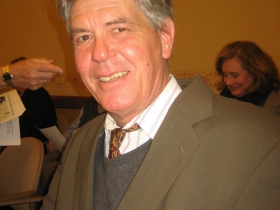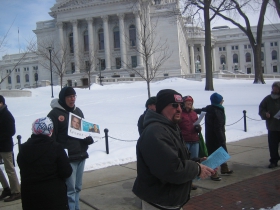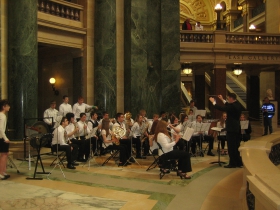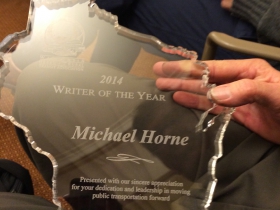The Transit Agenda
Supporters headed to the State Capitol for "Public Transportation Day," meeting with legislators, promoting their agenda, and handing out awards.
On Tuesday, March 4th, Jeramey Jannene and I headed to Madison on the Badger Bus to attend the 2014 “Public Transportation Day” events in the State Capitol building. Just two miles from our destination, the bus had to stop while we waited for a train to pass. Of course, it was a freight train. (Had it been a passenger train, Jeramey and I would have been on it.) But there is no such creature as a passenger train linking the state’s largest city with its seat of government.
This little episode put the whole day’s activities into relief as volunteers from Wisconsin’s 28 bus systems and 43 shared-ride taxi systems spread out to do a lit drop on the offices of the state’s 132 legislators. The transit day events were coordinated by the Wisconsin Urban & Rural Transit Association, whose Legislative Representative is Gary Goyke, a former Representative to the Legislature. His son, Rep. Evan Goyke, [D-18] was one of the 132 elect representatives to receive the package outlining the group’s agenda.
So, what are the issues facing transit operators and users these days? WURTA did an admirable job in limiting the list to just a few.
Federal Legislative Priorities:
- Shifting Demographics. “For the first time in our history, Americans are driving less,” the group notes. Every day 10,000 people turn 65 and might feel like moving to town and ditching the car. The 71 million people born after 1980 “are increasingly depending upon public transportation,” and are bringing new life and energy to communities like urban Milwaukee. To them increasingly, the automobile is a tool, and not an aspiration. Without increased [federal infrastructure] funding, communities “will be at a risk of losing population, tax base and economic activity.”
- Reauthorize Federal Surface Transportation Program. Wisconsin represents 1.8 percent of the nation’s population but receives just .74 percent of the nation’s transit funds, down from .9 percent in 2012.
- Capital Funding. “Wisconsin transit systems are in dire need of additional Federal capital investment.” Funds were dropped from an average annual investment of $12 million to $6.2 million.
- Economic and Community Development Legislation. “Legislation promoting economic or community development should include investment in pedestrian and transit infrastructure and expanded transit services.” You want to build a suburban office park? Fine. But not if there is no way for people to get to it.
State Legislative Priorities:
- Transit Operating Assistance. It would take nearly $19 million annually to restore state transit funding to its historic levels. “State imposed levy limits and reduced shared revenue payments have left municipalities with few options. … Reduced transit services have disproportionately impacted the working poor and middle class families.”
- Regional Transit Authorities. RTAs should be the model of intergovernmental cooperation, literally extending services across party and community lines. RTAs “could provide a predicatable, dedicated funding source and remove transit costs from the property tax.” In 2009 the legislature authorized three RTAs in Wisconsin, including the Southeast Wisconsin Regional Transit Authority which, heaven forbid, hoped to connect Milwaukee, Racine, Kenosha and Chicago by rail. In 2011 the legislature disbanded all RTAs in Wisconsin, devilishly forbade new ones and the SERTA had to return $21 million in federal funding. This legislation would make RTAs legal again, and could pave a way for the Fox River Valley cities of Fond du Lac, Appleton and Oshkosh to save a fortune and to improve their services.
- Establish Transit Capital Investment Program. The state does not finance transit capital improvements, and federal funds have diminished. This proposal would allow the state to fund transit capital improvements, much as the state has two programs to fund freight rail capital improvements. Since 1980 the State Freight Railroad Preservation Program has provided $175 million in funding, including grants of up to 80 percent, for freight rail infrastructure and for taxpayer-financed purchase “of abandoned rail lines in an effort to continue freight service, or for the preservation of the opportunity for future rail service.” The conservatives have no problem letting the public finance the infrastructure for freight rail operators, now awash in profits. The Canadian Pacific Railroad, with extensive track and operations in Wisconsin reported 2013 4th quarter profits up 30 percent from the previous year.
- Coordinate Public and Human Service Transportation. The state ignored Federal policy directives and implemented a Medicaid non-emergency transportation brokerage “in isolation and created a taxpayer funded program that seems to serve the broker alone.” That firm is MTM Inc. of Missouri.
Scene in the Capitol
As part of the Public Transportation Day events, WURTA held a news conference in the Capitol at which the legislative agenda was announced. Crystal Martin, the WURTA chair who runs paratransit operations for the City of Madison was among the folks introduced to the attendees. She gave a welcome and a Transit Week report to the audience. She was followed by Greg Seubert, director of Wausau Transit who, as WURTA legislative chair gave the outline of priorities listed above.

“Following that was the Presentation of the 2014 Outstanding Service Awards, and my opportunity, for once, to write ‘Full Disclosure’ in one on my columns.” – Michael Horne.
Following that was the Presentation of 2014 Outstanding Service Awards, and my opportunity, for once, to write “Full Disclosure” in one of my columns.
The 2014 Outstanding Public Service Award went to Ms. Susan Lemke, the Transit Director of the City of Stevens Point. This was presented by freshman State Representative Katrina Shankland, who once held her office hours on a bus, which seems like a fabulous idea that should be tried here. It would fit in excellently with the Senate District of Chris Larson, for example. Ms. Lemke is apparently a very efficient manager, and was warmly supported by friends and associates.
The 2014 Outstanding Statesman Award went to State Senator Jerry Petrowski [R-29], the Chairman of the Senate Committee on Transportation who was recognized for his “professionalism and fairness in leading transportation policy within the legislature.”
Petrowski said he used to take the bus downtown [Stevens Point] with his grandmother all the time. “A lot of people need to find a way to work, to pay their bills, take paratransit. Together we can do great things, but it takes willing parties to find an answer,” he said, before taking off to cast some votes with the willing parties that run the Wisconsin State Senate.
[Full Disclosure: I received the “2014 Outstanding Writer of the Year Award” for my “clever, factual and enlightening articles on transit awareness,” at this event. I am grateful for the recognition, and especially appreciate the support of Urban Milwaukee readers who have consistently shown a keen interest in transit and transportation funding politics.]
Plenty of Horne
-
Milwaukee Modernism Gains National Awards
 Dec 15th, 2025 by Michael Horne
Dec 15th, 2025 by Michael Horne
-
New Rainbow Crosswalks Mark Milwaukee’s LGBTQ+ History
 Oct 8th, 2025 by Michael Horne
Oct 8th, 2025 by Michael Horne
-
Welcome Back, Tripoli Country Club!
 May 27th, 2025 by Michael Horne
May 27th, 2025 by Michael Horne
























Great article as usual, and congrats on the award!
“In 2011 the legislature disbanded all RTAs in Wisconsin, devilishly forbade new ones and the SERTA had to return $21 million in federal funding.” This sounds just like the Republicans in DC saying: “If it came from Obama, we oppose it”. Here, it’s anything proposed by or supported by the Democrats. Our state is in desperate straights.